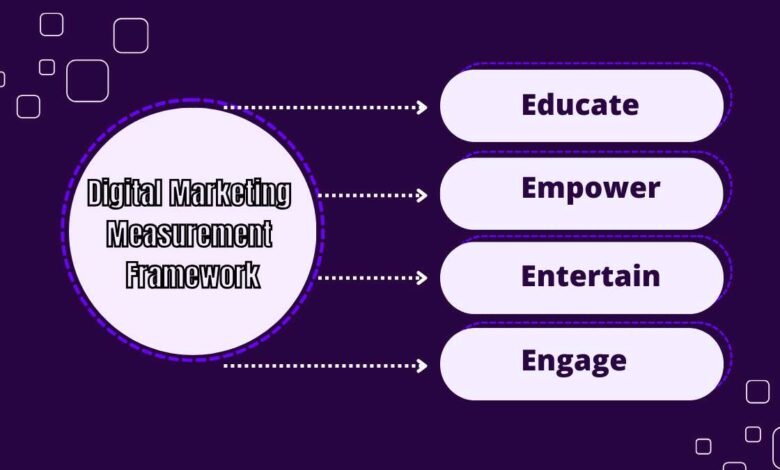Digital Marketing Measurement Framework: Ultimate Strategy

Digital marketing measurement framework is more than just creative campaigns and eye-catching advertisements. It’s about numbers, data, and results. This is where the comes in – a structured approach to evaluating the effectiveness of your efforts. Without the right metrics in place, businesses would be navigating blindly, unsure of whether their strategies are working or failing. A proper helps businesses pinpoint which marketing activities drive success and which need adjustment. In this article, we’ll dive into what a is, why it’s crucial, and how to build one, incorporating key concepts such asanalytics, performance metrics, conversion tracking, customer journey analysis, and key performance indicators (KPIs).
Understanding Digital Marketing Measurement Framework
A is a structured system that businesses use to measure, track, and analyze the effectiveness of their efforts. It connects marketing strategies directly to business goals by focusing on measurable outcomes. This framework serves as a roadmap, guiding marketers to the right tools, data, and insights that reveal the true performance of their campaigns.
Why a Digital Marketing Measurement Framework Is Essential
The importance of a cannot be overstated. Without a clear framework, businesses may end up focusing on vanity metrics that look good but offer little value in terms of business outcomes. The framework allows marketers to concentrate on actionable insights, driving data-backed decisions. For instance, businesses can use the framework to assess customer behavior, evaluate the impact of specific campaigns, and, most importantly, refine their strategies based on actual performance data. With a framework in place, companies can see beyond surface-level results and uncover the deeper factors driving success.
The Core Elements of a Digital Marketing Measurement Framework
To create a robust there are several core components that need to be considered. These elements will help shape the structure and effectiveness of the framework.
Marketing Analytics

At the heart of any measurement framework is marketing analytics. This refers to the practice of analyzing marketing data to make informed decisions. Marketing analytics tools can help businesses understand how their campaigns are performing, what channels are driving conversions, and which strategies are most effective. For example, businesses might track the number of visitors to their website, assess social media engagement rates, or measure how long customers spend on product pages. By analyzing these metrics, businesses can gain valuable insights into what’s working and where they need to improve.
Must Visit: Digitzo
Performance Metrics
Performance metrics are the tangible measurements that showcase how well marketing campaigns are doing. These metrics are often tied directly to specific goals or objectives.
Some common performance metrics include
These metrics help businesses understand whether their marketing efforts are achieving their intended outcomes. By consistently monitoring performance metrics, businesses can fine-tune their strategies to improve results.
Conversion Tracking
One of the most critical aspects of a digital marketing measurement framework is conversion tracking. This involves tracking the actions that users take after interacting with your marketing materials, such as signing up for a newsletter, making a purchase, or downloading an ebook. Tracking conversions is essential because it allows businesses to see how effectively their marketing campaigns are driving customer actions. By identifying which campaigns lead to conversions, marketers can allocate resources to the most successful strategies and optimize underperforming ones.
Customer Journey Analysis
Understanding the customer journey is key to creating a successful. The customer journey refers to the various stages a customer goes through, from discovering a product to making a purchase. With customer journey analysis, businesses can gain insight into how customers interact with their brand at each touchpoint. This analysis helps marketers understand where customers are dropping off in the journey and which stages of the funnel need improvement. For example, if many customers abandon their carts during the checkout process, businesses may need to simplify their payment systems or offer incentives to complete the purchase. Analyzing the customer journey provides a clear picture of what’s working and what needs to be optimized.
Key Performance Indicators (KPIs)
No is complete without Key Performance Indicators (KPIs). KPIs are specific, measurable goals that help businesses track their progress and determine whether their marketing efforts are successful. For example, if the goal of a marketing campaign is to increase brand awareness, a relevant KPI might be the number of new followers on social media. If the goal is to boost sales, the KPI could be the number of completed transactions. Setting clear KPIs helps businesses stay focused on their goals and measure success in a meaningful way. It also provides a benchmark for comparison, making it easier to determine whether marketing strategies need to be adjusted.
Building a Digital Marketing Measurement Framework
Now that we’ve covered the essential elements, let’s explore how to build a . Here’s a step-by-step approach:
Set Clear Business Objectives
Before diving into metrics and data, businesses need to define their overarching goals. Are you looking to increase brand awareness? Drive more sales? Generate leads? These objectives will serve as the foundation for your measurement framework.
Identify Relevant KPIs
Once your business objectives are clear, the next step is to identify the Key Performance Indicators (KPIs) that will help you measure success. For example, if your goal is to generate leads, your KPI might be the number of completed lead forms on your website.
Select the Right Tools for Data Collection
To gather accurate data, businesses need to use the right tools. This might include platforms like Google Analytics for website tracking, CRM systems for lead tracking, and social media analytics tools to monitor engagement.
Track and Measure Performance Metrics
Once you have the right tools in place, you can begin tracking the performance metrics that align with your KPIs. Consistent monitoring allows businesses to evaluate their campaigns in real-time and make data-driven adjustments as needed.
Analyze the Customer Journey

Understanding the customer journey is critical to a successful digital marketing measurement framework. Businesses should map out the key touchpoints in the customer journey and analyze how users interact with their brand at each stage.
Refine Strategies Based on Insights
With data in hand, the final step is to analyze the results and refine your marketing strategies accordingly. This might mean reallocating resources to more successful channels, improving weak areas of the customer journey, or adjusting KPIs based on new information.
Conclusion
A well-defined is crucial for any business looking to succeed in today’s competitive landscape. By leveraging marketing analytics, tracking conversions, analyzing the customer journey, and focusing on performance metrics, businesses can ensure their marketing efforts are driving real results. Whether you’re a small business or a large enterprise, the insights gained from a solid measurement framework will help you fine-tune your strategies and achieve your business goals.
Read More: About Cyber Security




